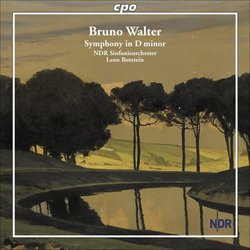| All Artists: Walter, Botstein, NDR Sinfonieorchester Title: Walter: Symphony in D minor Members Wishing: 0 Total Copies: 0 Label: Cpo Records Original Release Date: 1/1/2009 Re-Release Date: 2/10/2009 Genre: Classical Style: Symphonies Number of Discs: 1 SwapaCD Credits: 1 UPC: 761203716326 |
Search - Walter, Botstein, NDR Sinfonieorchester :: Walter: Symphony in D minor
CD Details |
CD ReviewsA major symphonic re-discovery.... Douglas M. May | 07/25/2009 (4 out of 5 stars) "I have nothing to add to the excellent factual references contained in the previous review. But my impression of the music is somewhat different. This symphony does NOT resemble Berg or Zemlinsky. In its elliptical developmental procedures, it more closely resembles the symphonies of Karl Weigl (another Mahler disciple) or even passages in the early works of Havergal Brian. It isn't that Walter is incapable of writing a good tune. It's just that he usually blurs the melody with counterpoint or buries it in the low strings or leaves it unsupported by the fin-de-siecle harmonizations favored by Mahler. Instead of developing the theme to its logical conclusion (and/or milking the emotional content to its "satisfying" catharsis), Walter simply tosses out another idea--although the initial idea goes off and hides and then reappears in some unexpected context. Mahler's way of working up a climax is there, and his way of writing for brass. But there are none of his programmatic references, none of his ironic juxtapositions of happy and sad, little of his chromatic modulatory strategies and very little of his Sehnsucht. I think it's now possible to talk about an Aesthetic of Ugliness that offers a way around the whole tonality/atonality impasse. I'm thinking of composers like Weigl, Fritz Brun, Furtwangler, Walter, who succeeded in writing completely tonal music while tapping into the "ugly" emotional realities of Pierrot Lunaire and the Berg Violin Concerto. The world of this music is fundamentally different from Mahler's late-romantic world--although had Mahler lived on, he probably would have evolved in this direction (based on the incomplete sketches of the 10th Symphony). So, while this is not a completely successful symphony, it is in my opinion a much more satisfying score than the early and derivative Zemlinsky symphonies or the student symphony of Schrecker. And to my ears at least, this is a magnificent performance, full of anger, pathos and anxiety, and resplendent with details. I hope Botstein records the 2nd; Hyperion has issued the violin sonata, which I just added to my Wish List. A fascinating disk all the way around. " A Proto-Expressionist Symphony by Bruno Walter J Scott Morrison | Middlebury VT, USA | 02/19/2009 (3 out of 5 stars) "Most of us of a certain age remember Bruno Walter as the genial conductor of some of the most important Columbia discs of the 1950s. He, of course, had been a protégé of Mahler and as a young man had given premieres of some of his works (e.g. Das Lied von der Erde and the Ninth Symphony). Early on he had intended to be a composer/conductor like his mentor. And he wrote two symphonies, this recording of the First being only the second performance of it since its premiere in 1907. But he gave up on composing shortly thereafter. He had shown this symphony to Mahler who had a tepid reaction to it and later wrote 'Unfortunately, it means nothing to me, and my frank opinion put him [Walter] in a state of mild despair.' I think Mahler was on to something. Although this work -- nearly an hour long -- has some moments, it strikes me as awkwardly written, with tortured counterpoint, undistinguished thematic material, and in the first two movements at least an atmosphere of unrelieved murky gloom. It does, of course, partake of those expressionistic elements characteristic of the emerging Second Viennese School and probably is closest in effect to that of the music of Berg. Still, one can think of marvelous works by such composers as Berg, Zemlinsky, and early Schoenberg that leave it in the dust.
The first movement, nearly twenty minutes long, is a crushingly angst-ridden muddle. The second movement, an adagio, is almost as long and its manner is even more crepuscular. The scherzo is a sardonic waltz whose manner comes closest to that of Mahler and it is actually my favorite of the four movements. The finale puts us back again in the tortured nighttime but it does conclude with a bang-up finish. I suppose one could compare this symphony with Mahler's Seventh, the popularly-called 'Song of the Night', but it comes nowhere near having that admittedly difficult symphony's power. The performance by the adventurous conductor, Leon Botstein, and the NDR Symphony does at times sound a bit tentative and indeed, since this symphony has no performance history over the last ninety years, this is not a big surprise. Still, this is the only game in town and if you are interested to hear music written by this giant conductor, this CD would have to be it. I applaud the cpo label for bringing us music by otherwise unheard conductor/composers -- one immediately thinks of the music of Felix Weingartner they've have brought out Felix Weingartner: Symphony No. 1; König Lear [Hybrid SACD] -- but I'm not terribly high on this particular one. Scott Morrison" |

